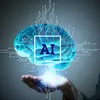Why Infosys believes that AI must be approached as a journey, not a destination
Balakrishna D R, of Infosys, tells YourStory the key benefits enterprises can derive from AI-based solutions, and how the IT major’s consulting-led approach differentiates it from the competition.
Artificial intelligence (AI) is no longer a buzzword; it is standing tall as a transformational technology of the digital age. The practical applications it provides across industries and sectors and the economic potential it holds have made the technology an enterprise favourite.
Big and small enterprises have started to integrate AI-based solutions to get future-ready. And Infosys, India’s second largest technology services company, is leading the way with its AI platform that offers innovative solutions.
Balakrishna D R, aka Bali, Senior Vice President, Service Offering Head – Energy, communications, Services and AI & Automation Services, spoke to YourStory about what makes AI the technology of the future and how Infosys is differentiating itself in this hyper-competitive segment.
YourStory: What are the key benefits enterprises can derive from the implementation of AI-based solutions?
Balakrishna DR: AI accelerates and democratises the decision-making process in an organisation, reducing the distance between employees and clients as well as enriching user experience. The benefits are realised only when the technology is scaled across the organisation.
A good example is a leading telecommunications giant that wanted to enable real-time collaboration among its employees by breaking data siloes and using AI to help in decision making. Infosys AI and Automation Services created an AI marketplace for the company by designing a “platform of platforms”.
This machine learning-driven platform helps employees set up challenges, and compete and collaborate across the organisation. It also enables better and faster predictions with humans working alongside AI-powered bots. Several hundred employees are using this platform for forecasting, modelling, and creating new experiences for end users.

Balakrishna D R, SVP, Service Offering Head – Energy, Communications, Services, and AI & Automation Services, Infosys.
At Infosys, we believe that it takes three zeroes to scale AI adoption within an enterprise – zero distance to information and insights, zero disruption to business operations, and zero latency to business processes.
This means building an integrated approach to problem solving and identification, driving actionable insights, and solutions that accelerate adoption.
Relying on the three key pillars - AI and automation (as the technology lever), lean methods (as the process lever) and design thinking (as the innovation lever), we work across consulting, technology, and operations. This holistic approach helps us reimagine business and processes to create innovative business models.
YS: Tell us about Infosys’ consulting-led approach towards AI?
BDR: Infosys’ consulting-led approach focuses on finding, framing and solving unique business problems that leverage AI to create measurable business value. The business value is driven by top-down identification of strategic priorities, value-driven prioritisation, and constant value creation monitoring.
It is important to approach AI as a journey and not just as an immediate destination reached with a few proof of concepts (PoCs) and pilots.
The approach also emphasises that for AI to scale successfully, a project must be business-driven and not just an IT initiative run by the CIO’s office. Having a consistent sense of the ROI created from any AI related initiative is crucial. No project should be kicked off if we are not able to answer one simple question: “How much is this effort going to bring to the enterprise?”
Here are the key tenets of Infosys’ consultant-led engagement on AI:
Start business-inward, not algorithms-outward: Several AI initiatives in the organisations start with a technology-led transformation rather than a business need that must be addressed. A deeper understanding of the domain and process is key to arriving at the problem statement.
Focus on the process first: Understand the business process across all aspects of business pain points, priorities, constraints, and value maps. Productivity, decision making, and quality aspects of the process provide insights for the technology roadmap.
Integrated capabilities: At Infosys, technology services offerings are intertwined with consulting offerings, where the teams bring complementary competencies. While the technology practice brings in AI technology capabilities, the consulting team discovers and identifies the best-fit business opportunities and brings in domain expertise.
Take a life-cycle management view: The alignment between technology and consulting teams continues throughout the lifecycle of any project —from implementation, deployment and training to ultimately driving large-scale adoption in production.
YS: What are the key challenges hindering the faster adoption of AI-based innovations or solutions?
BDR: While digital natives are comfortable adopting AI, traditional large enterprises are yet to embrace it extensively. The potential is lucrative, but enterprises aren’t exactly rolling it out because of factors such as the absence of a clear strategy, lack of organised data, skills shortage, and functional silos within the organisation.
Organisations who are early adopters of AI are struggling to accrue benefits because they have not been successful in scaling and democratising AI. Also, only 18 percent have a clear strategy in place for sourcing the data that enables AI work.
The dearth of trained talent with AI skills also plays a role in slowing adoption. At the same time, to adopt AI seamlessly, organisations need to take additional measures to ensure better security, governance, and change management.
Having said that, we are likely to see most of these hurdles being overcome as technology evolves at breakneck speed. For instance, data synthesis methodologies are now available to combat data challenges in AI. With the emergence of techniques such as transfer learning and meta learning, the need for high volume data is also reducing. Aspects like explainability of AI, elimination of bias, and ensuring AI is used ethically are becoming mainstream in the enterprise context.
Today, we can automate the steps and processes involved in the life cycle of creating, deploying, managing, and operating AI models, which helps in scaling AI adoption more widely into the enterprise. Even challenges such as inadequate workforce skills will start to abate over the next few years as more engineers and scientists get trained and become industry-ready.
YS: Could you give us a couple of examples of how Infosys’ consulting-led approach has benefited enterprises?
BDR: We implemented a Centre of Excellence-driven strategy for the discovery and delivery of AI and automation opportunities within a global healthcare equipment manufacturer. The implementation is already delivering more than 30 percent net cost reduction in core processes and identifying revenue-increasing opportunities in customer-interfacing areas.
We worked with a global oil and gas company where we offered holistic support in terms of defining enterprise-wide AI strategy. This involved handling the setup and support of Centre of Excellence, and initiating common discovery efforts across the organisation. We also worked on communication and visibility on use cases across business units, and the establishment of a single AI portal for all stakeholders to stay up to speed with developments. These efforts resulted in cost savings of more than 50 percent in core processes.
In another case, we worked with SPARK ANZ through a consulting-led, integrated, process-first approach. We started with small, specific problems that were not among the most complex organisational issues to solve but that were sure to prove and show value. For example: AI and predictive ML applications in network capacity planning and server patching. Change management to help overcome the employees’ fear of automation was a priority. Also, scaling up was not just about incremental multiplication; it required significant investments in orchestration, management, security, lifecycle management, and governance of checks and balances.
YS: Which sectors, according to Infosys, are the early adopters of AI-based solutions?
BDR: Healthcare, financial services, retail and CPG, and telecom industries are some of the early adopters of AI-based solutions. Here are some industry-specific use-cases:
Financial services: AI can play a role in data extraction, data validation, breach detection, and customer risk profiling. In banking, AI finds application in areas such as fraud detection, anti-money laundering, regulatory reporting, document extraction, payment reminder follow-ups, and real-time user authentication.
Insurance: The industry can benefit greatly from AI, especially in areas such as claim data extraction, claim management, regulatory compliance, risk evaluation, adjudication, and match to issued policy.
Retail and CPG: AI can help streamline distributed marketplaces, food auditing, inventory control, loyalty programmes, procurement optimisation, and drive supply chain traceability.
Media and telecom: The technology can help significantly enhance network operations and improve fraud detection, predictive maintenance, and customer service.
YS: How is Infosys leveraging various AI technology platforms, in-house and third party, to deliver optimum solutions?
BDR: Infosys has invested in building a strong AI partner ecosystem including partnerships with startups, research organisations, and industry.
For instance, we have partnerships with universities such as Stanford, MIT, and Indraprastha Institute of Information Technology (Delhi). On the industry front, we have partnerships with Microsoft Azure Cognitive Services and IBM Watson among others. There have also been several investments in startups such as Trifacta, TidalScale, and Whoop.
Infosys is known for its consulting capabilities and business outcome-focused approaches, with integrated consulting and AI service teams, from the top leadership to the operational execution layers. This ensures an end-to-end value creation journey with clients.
We not only create our own in-house platforms (Nia, Edge platforms, Cybersecurity platform, etc.), but also work with customers to co-create custom AI platforms using some of the best-in-class open source and licensed software.
(Edited by Teja Lele Desai)










